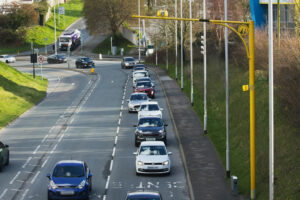A series of enforcement schemes specifically chosen with air quality in mind are being switched on across four sites in Wales.
Average speed cameras are common across the UK, with more than two hundred Jenoptik SPECS systems in operation, but their locations are usually chosen at sites with a high number of serious collisions. However, the schemes in Wales are at areas where reductions in speeds, along with smoother traffic flows, will see reduced emissions.
Since 50mph speed limits were introduced in 2018, nitrogen dioxide levels in those areas have fallen by up to 47%, helping to protect people from serious illness as well as playing a part in tackling the climate emergency.
The Welsh Government is now looking to maximise those benefits by enforcing the limits using Jenoptik SPECS average speed cameras, which monitor the number plates of vehicles as they pass fixed points on the network, then calculates the time taken compared with how long it should take if the vehicle was driving at the speed limit. Vehicles taking less time can therefore be shown to be going too fast.
“Statistics show that when installed as part of a casualty reduction scheme, average speed cameras are startlingly effective, significantly cutting the number of killed and seriously injured people,” commented Jenoptik UK Deputy Managing Director Geoff Collins. “However, they also lead to less speed variability and reduced emissions, meaning better air quality, so it is very forward-thinking of the Welsh Government to take advantage of their benefits in this way. The advantage is that average speed cameras have the support of drivers, with anecdotal evidence suggesting they are far more accepted and popular than spot-speed cameras.”
Deputy Minister for Climate Change, Lee Waters, who has a responsibility for Transport said that introducing the cameras will help Wales go “further and faster” in cutting emissions saying, “It’s clear that the speed restrictions we’ve introduced on our most polluted roads are working – the results speak for themselves – but compliance with these limits is essential if we are to achieve the reductions we need to make in the shortest possible time, while South Wales Police, Roads Policing Lead for Wales, Assistant Chief Constable, Mark Travis added, “The implementation of the 50mph speed limits, for environmental reasons, on some of Wales’s busiest roads is an important issue to tackle pollution and to give Wales and its communities a cleaner and healthier future.”
Initially many of those caught breaking the limit may receive a warning letter, while the worst offenders will be fined. “By supporting the Welsh Government’s ambition to improve air quality for Wales, we know our roads will be safer too,” commented GoSafe Partnership Manager Teresa Ciano. “By implementing a first of its kind advisory letter programme, we will be able to inform people of the importance of complying with the speed limit at these locations, whilst still prosecuting the most dangerous drivers.”
(Picture – Jenoptik)
























